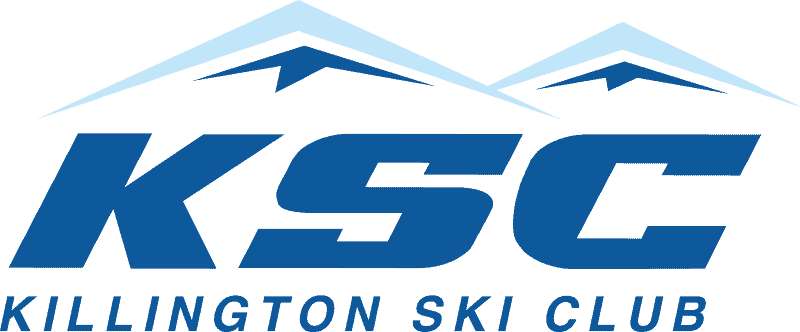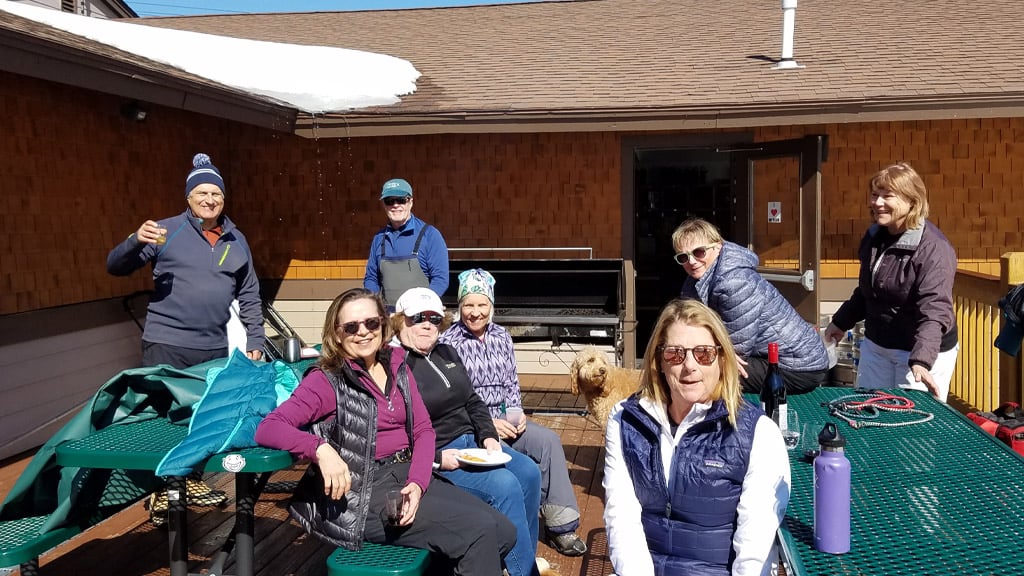Event Volunteers
Competition Work Day Information
Official Volunteer meeting place is in the KSC Coaches Educational Center
Many opportunities exist both off and on the hill. Work day credits vary per position. If a position requires experience and/or certification, it is noted in the description. Registration for work days is completed online. An email confirmation will be sent out prior to the event day to all workers with position and event day information.
Some of these definitions are taken directly from the USSA Competition Guide. The descriptions, expectations, information are modified to the Killington Competitions Program needs.
Descriptions are listed in alphabetical order of the position. While ensuring a smooth event is important, let’s also ensure we have fun.
Once you have fulfilled your Work Obligation and you would like to volunteer more for events you will begin earning a Killington Resort day voucher good for one year from issue date, i.e. Work 1 day receive 1 voucher; Work 5 days receive 5 vouchers.
Volunteer Credit Information
Reports to the timing room 1 hour prior to the start of the event, and finishes after the last competitor crosses the finish line. Responsibilities include:
- Announcing bib number, name, team, in start, on course and finish time of each (this information is read directly from the timing computer screen);
- Ensuring proper and clear pronunciation of each competitors name;
- No experience necessary.
Reports to the finish area at the start of the second run with bib collection bag/box. Responsibilities include:
- Ensuring you get the bib from each competitor, whether or not he/she crosses the finish line (i.e. DNF); this may require chasing down the competitor as he/she exits the finish area and helping him/her to take off the bib;
- Bring all bibs back to club to sort, dry and return to correct storage bin;
- Note any missing bibs and return this information to the Event Administrator;
- No experience necessary.
USSA Officials Membership and experience are required. The Chief of Course is responsible for the preparation of the courses in accordance with the directives and decisions of the Jury. The Chief of Course must be familiar with local snow conditions on the terrain concerned. Training for this position can occur on event days with the Chief of Course for that event with work day credits accrued.
Experience required. The Chief Gate Judge organizes and supervises the work of the gate judges as follows:
- Provides instruction and necessary materials to Gate Judge team prior to event start;
- Designates the gates each Gate Judge will watch;
- Collects Gate Judge cards at the end of each run for delivery to Referee;
- Ensures numbering and marking of event course gates are completed within the required time;
- Is prepared to offer assistance to help keep spectators off course, and/or help maintain course.
USSA Officials Membership and experience are required. The Chief of Event directs all preparation of the completion and supervises the activities in the technical area. The chief of Event summons meetings for the consideration of technical questions and leads the Team Captains’ Meetings after consultation with the Technical Delegate. Training for this position can occur on event days with the Chief of Event for that event with work day credits accrued.
USSA Officials Membership is required. The Finish Referee is a non-voting member of the Jury and is listed in the paperwork as a Jury Advisor. This person arrives 1 hour prior to event start, remains in the finish for the duration of the event and is responsible for:
- Ensuring that the finish corral is properly set;
- Assist and supervise hand timer at finish if needed;
- Having a radio with communication to the start;
- Overall control of the finish area for timing, competitor and crowd conduct, and safe operation.
All Gate Judges need to arrive approximately 1.5 hours prior to the start of the event. First time Gate Judges will be instructed on proper gate judging techniques prior to the start of the event. Gate judges will meet in the lower level of the ski club and obtain gate judge bibs, clipboard, pencils and papers, and to meet with the Head Gate Judge to receive assignments. At the end of each run, each Gate Judge will remain in place until the Head Gate Judge collects each individual’s card. Second run placement times and locations will be determined by the Head Gate Judge. After the second run, cards will be collected by the Head Gate Judge. Gate judges will return to and remain in the ski club for approximately 15 minutes after the end of the event in the event there are any challenges to the posted disqualifications. All Gate Judges should return materials to Chief Gate Judge. NON-SKIERS CAN PARTICIPATE AND BE ASSIGNED TO GATES WITHIN WALKING DISTANCE OF THE FINISH.
- No experience required.
This person is responsible for communicating to the timing room when a competitor is approaching the sight-line of the timing room. This position is used during GS (Giant Slalom) events where the start is located further up the course, past the sight line of the staff in the timing room. The purpose is to communicate to the timing room (via headset) that competitor’s location prior to the competitor coming into view to timing room staff. This position will check-in 1 hour prior to event start at the coach’s ED. Center and will need a start list and skis for course access. This position remains on the hill during the duration of each run, with a break between first and second run.
- No experience required.
This position requires you to be on skis and ready to go at 7:00 AM. Event/Freestyle Crew works to ensure the course, start and finish corral are ready prior to start; during the event they are directed by the Chief of Course as to what they are to work on, including but not limited to: slipping, shoveling, chopping, resetting gates, and shuttling equipment. The purpose of the Event/Freestyle Crew is to help ensure the event fairness through the very last competitor to the best of their ability. Event/Freestyle Crew is also responsible for the breakdown of the course/venue at the end of the day.
Volunteers arrive and are ready at 7:00 a.m. on event day, meeting in the KSC Coaches Educational Center.
Responsibilities include:
- When the competitor arrives, the registration process involves checking a name against the start list to confirm that the correct bib is going to the correct competitor;
- Confirm if competitor has paid and collect any unpaid fees;
- Distribute bib and lift ticket to competitor
- Once the event has started, bring any extra bibs back to Event Secretary;
- Clean-up registration area, returning tables and bringing back any supplies to the club office.
- No experience required.
Once this is complete, most registration volunteers will move into another volunteer position for the remainder of the event day.
On most event days the scoreboard will be prepared in advance, however there may be occasions when the scoreboard will need to be completed/updated prior to event start, which is then the responsibility of the Scoreboard Recorder. The Scoreboard Recorder writes the finish time of each competitor as it is announced from the timing room. Please note that the times on the scoreboard ARE NOT OFFICIAL; any concerns about competitor times from competitors, coaches, parents… will need to be addressed with officials, not you, at the end of the event.
- No experience required.
The Starter helps the Start Referee get the start area organized and ready for the athletes, as well as breakdown after the event. The starter should arrive with a start list at least 30 minutes prior to the first competitor (forerunner) on course. He/she is responsible for:
- Helping Timing as needed;
- Giving ‘on-deck’ calls to competitors; giving start commands to competitors as stated in the USSA Competition Manual;
- Ensuring accuracy of intervals between competitors;
- No experience required.
The Starter wears a headset during the event for constant communication with the timing room to help keep the flow of the event going. Skis are required to get to the course.
No experience is necessary however a booming and resounding voice is! The Start Organizer’s main job is lining up athletes so they enter the start in the correct order. Competitors will not hear numbers called, will forget bibs, are plugged in…. you are there to help resolve the issues before the competitor is in the start gate. Skis are required as is collecting a start list from the Event Secretary.
This person arrives 1 hour prior to event start, and skis are required for course access.
- No experience required.
USSA Officials Membership is required. The Start Referee is a non-voting member of the Jury and is listed in the paperwork as a Jury Advisor. This person remains at the start for the duration of the event and is responsible for:
- Setting up the start area and helping Timing set up the start wand;
- Working with other start staff to control the start area before, during and after the event;
- Determine late and false starts;
- Report any infringements or violations of any rules;
- Report the names of competitors who did not start, false started, late starts.
This person arrives 1 hour prior to event start, and skis are required for course access.
The Hand Timer should plan to be on course at least 30 minutes prior to the start of the event. Hand Timers receive instruction, paperwork and a stop watch from the Chief of Timing and Calculations in the Timing room. Hand Timers push a button on a start clock for each competitor’s start or finish. This is a back-up time for any competitor who does not receive a time due to the possibility of an error with the hardwired times. It is important for Hand Timers to be consistent with all competitors when the time is started/stopped on the stop watch so that all times are consistent. Skis are required for Hand Timer at Start, though not at finish.
- No experience required.
ome related experience is necessary for the role of Primary Timer; hence anyone who has performed any timing in the past is eligible to do some primary timing. The Primary Timer works in the timing tower and operates the primary timing system known as Split Second software. The Primary Timer wears a headset and is in constant communication with the start and other timing officials. The Primary Timer arrives at least 1.5 hour in advance of event start.
No experience required, so now is your chance to learn something new. The Secondary Timer will:
- Work with the Primary Timer in the timing room (the Primary Timer will provide an introduction to specifics and be available to assist the Secondary Timer);
- Wear a headset for communication within timing team;
- Monitor computer screen to be sure that the right time is being assigned to the correct competitor.
- The Secondary Timer should report to the timing tower 1 hour prior to the start of the event.
No experience required, so now is your chance to learn how to use a shovel.
- This is an outdoor assignment.
- Can be done in ski or snow boots, minor hiking required.
- The job consists of chopping the snow to make it softer for athletes landing from Freestyle jumps.
- This is an outdoor assignment.
- Could involve activity through running scores.
Get The Latest Killington Ski Club News!
Sign up and receive latest news, event and race info from the Killington Ski Club! Please note we do not share your e-mail address with anyone. You can always unsubscribe when you want!



